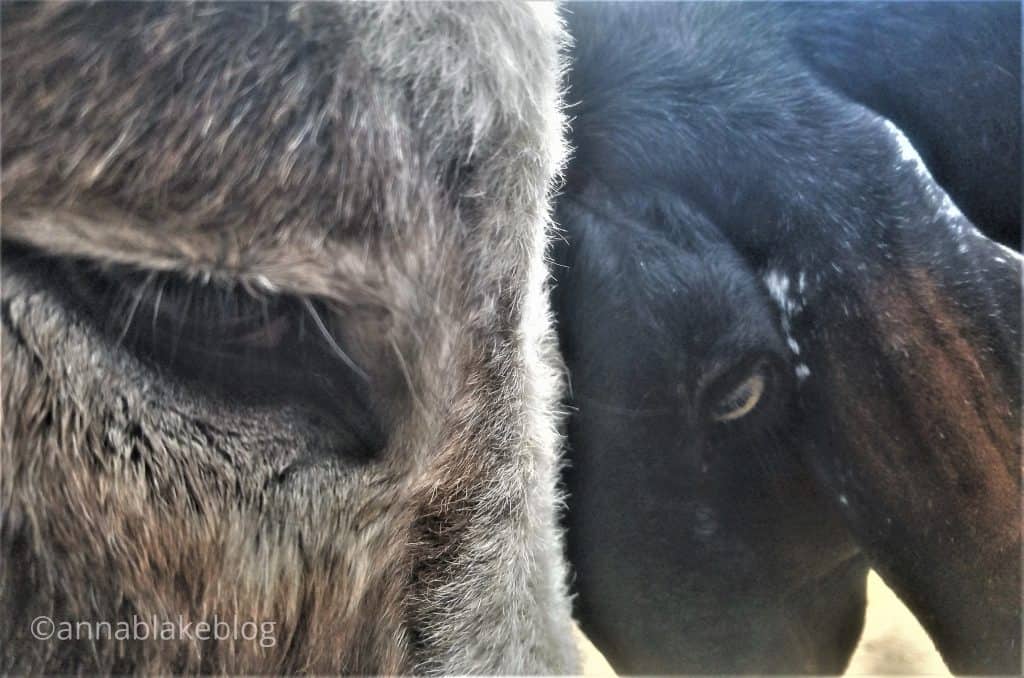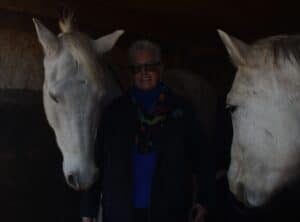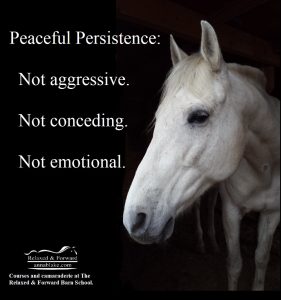
Can you tell when someone’s looking at you? Or maybe a child in a waiting room, or it could be your mother. They are big at staring. It’s easy to feel your dog’s eyes, a language without words. What about a stare from someone who doesn’t look like you in a coffee shop? What about walking down an unfamiliar street at night while someone across the road walks parallel while looking at you? Of course, you notice. This last example is probably the closest to how horses feel when we scrutinize them for a calming signal. Can you imagine the glare white-hot glare experienced by animals, especially prey animals, when we stare at them? Wait, do you even notice you’re staring?
At a recent clinic, we moved as a group to a close-by farm where some participants kept their horses in a well-settled herd in a large turnout. The sight of a group of strangers standing and staring respectfully totally undid them. On one hand, we saw lots of calming signals, but if they do them because of us, we have intruded over the line of watching and into the realm of stalking prey. Owners didn’t recognize their horses. We were coyotes. Want another example of staring causing stress? Any vet visit.
My colleague and friend in Australia, Megan, asked if I would say something about the art of looking without looking. This comes up a lot when we talk with clients about calming signals. Earnest students stare with the intensity of a double-barreled lighthouse and sure enough, the horse looks away. A lot of horses close their eyes when our intensity is overwhelming. Others might graze frantically, stress eating. Or drop and roll for a reset when the incident is over. There are a few reasons a horse might use these calming signals, and there is much for us to learn. But do we want to be the cause?
The problem isn’t how limited our senses are compared to other mammals. It’s that we think we know everything. The language of horses is subtle, and we roll in loud and abrasive without intent to disrupt. Daydreaming rather than being aware of the environment. Our senses, never that sharp to begin with, get dull and rusty from lack of more than cursory use. It isn’t that we never inspect a wound, for example. It’s that we have enough self-awareness to adjust our volume to be easier on the horse the rest of the time.
The idea of looking without looking means to focus your attention by unfocusing your eyes. Alert in your senses, but quiet in your body.
I first learned this way of seeing while studying martial arts. The instructor asked us to look at a thing, but then soften our gaze and quietly notice what else we could see in our peripheral vision. The things we could see without moving our heads. It is not having a laser focus on a point, but a soft focus on a wider view. It’s a way of picking up movement in a crowd or having a wider view. The more you use it, the clearer it gets. In our case, it’s seeing the space the horse’s body inhabits instead of glaring into his eye. We become less aggressive in our bodies and less of a threat to our thousand-pound partners.
I’ve seen folks approaching a horse, doing strange things, trying to mimic them. Turning bodies at weird angles, pretending to do horse behaviors, yawn to make the horse yawn. Or sitting in a chair as if they are distracted. We are obvious; they read us like a comic book. We would do better to not try to fool animals whose senses are so much more acute than ours.
I want to listen, but not cue behaviors. Not pretending to be another species, I’d rather try to turn myself into a safe place. Think of it as a cloaking device that makes me slightly less visible. Softening my vision cools my energy. If I need to adjust the energy of my body, I’ll use my breath to inhale and let the energy in my solar plexus percolate or settle. I might move my feet, but my hands are the last resort, the choice of a predator. Let calmness start with your eyes.
Instead of mocking horses (sorry/not sorry) I will train myself to soften my vision. I will notice my breath and if I’m not breathing, I’ll make a new habit of rhythmic breathing. I’ll practice and give myself affirmations that I’m doing well. And while I’m doing that, I’ll let my vision go wide, I’ll make a new habit of softening my eyes, looking without looking, and practice that as well. I’ll have to train myself because I’m only human. I have limited senses compared to other mammals.
Something about this exercise should seem familiar. Yup, it’s the way horses see the world. They can’t see directly in front or behind themselves, but use strong peripheral vision in a sweeping arc from both flanks. We’re learning to see the world as a horse does, to use our senses rather than leaping to conclusions with that overbearing frontal cortex of ours. We quiet the noise and try to sense movement outside our stillness. It’s a Zen-ish concept. We look without looking.
Here’s how you can tell you’re doing it right:
- We notice we can focus longer; more engaged in the environment, less distracted by chatter and bad advice.
- We notice we’re standing farther away because we can see the stress we cause being too close.
- We notice the sweetness in the air, the comfort of the Earth holding our weight, the quiet thrill of breathing.
- We notice dogs come to us with a slow wag and lay at our feet.
- We stop asking, cuing, nagging, and start listening. Our horses begin to relax.
- We wait for the horse to communicate. It will take time because horses expect us to interrupt.
- We wait some more, and they become responsive. Not really, but we notice it now.
- We oil our gate hinges because the noise is suddenly offensive.
- We can never sneak up on a horse, but sometimes they pretend we haven’t disturbed them.
- We groom like it’s a slow dance because their calming signals say they like it that way.
- We change anything else they ask us to. It’s not about us. (for Megan)
- We notice the horse is calmer, more confident. We are ridiculously grateful. Amen.
- We hear their breathing in rhythm with ours. Then we get over ourselves, but keep breathing.
- We stop being so boy-howdy holy and let out a fart. The horses blow, and we relax more.
- We notice that our horses willingly volunteer for any task.
- We stop being anything we used to think we wanted to be. We are almost invisible.
- We don’t worry about whether the horse’s eye is soft because ours is. We’ve changed teams.

…
If you appreciate what I do, please Subscribe to this blog or join us at The Barn School.

Anna Blake, Relaxed & Forward
Want more? Become a “Barnie.” Subscribe to our online training group with affirmative demonstration videos, audio blogs, daily quotes, free participation in “group lessons”, and live chats with Anna. Become part of the most supportive group of like-minded horsepeople anywhere.
Anna teaches ongoing courses like Calming Signals and Affirmative Training at The Barn School, along with virtual clinics and our infamous Happy Hour. Everyone’s welcome.
Visit annablake.com to find archived blogs, purchase signed books, schedule a live consultation, subscribe for email delivery of this blog, or ask a question about the art and science of working with horses.
I still don’t know why your words of horse wisdom are not published world-wide in horse publications, both on-line and in print on a regular basis. What you convey is too important and too life-altering (for the horse, and interestingly enough, the human) not to be used to increase the understanding and the welfare of horses. It’s needed, Anna. We all know that. I am going to start spreading the word even more. GO TEAM HORSE!
Thanks Kathy. I do get published, but I’m not exactly politically correct sometimes…
I don’t know any female trail blazer that was politically correct! I am proud to keep talking about you. Just today I had a conversation about you in a stall with a horse… and another human. They’re comin’ around, Anna!
Ah that politically incorrectness or perhaps suggestion of a better way?
That rests in the ear of the beholder. Traditions are hard to break.
YES! When I got my new horse six months ago he came with a ten-year history of being impossible to catch in the pasture. I have been working with Anna long enough to know how to fix that. When he first went out into the gelding pasture I wasn’t able to touch him for three weeks. Losing the coyote stare was a huge part of my strategy. When I would stand surveying the horizon instead of focusing on him, he would get closer and closer. I just waited him out and since I wasn’t acting like a predator, or tricking him, I became interesting. Now, if he isn’t meeting me at the gate he comes to me as a walk to him. The only problem we have is that I have become interesting to the whole herd and some days he has competition. What can happen when we stop acting like predators and remember to breathe is amazing. Thank you Anna!
Thanks, Peggy. Elegante might make me just as happy as he makes you. It’s great on your side, but even better for him. He might be the loudest thank you.
Love. This. My first horse taught me not to stare or demand with my body. She was in a 43 acre pasture with other horses, and didn’t have much use for a 12 yo who knew nothing. I stalked that mare for hours up and down hills. I thought I’d wear her down. Nope. I gave up. Turned and walked to a boulder and sat, looking away from her. Did she magically come? No. But when I got up to leave, I noticed she’d stepped out of the herd slightly, and was pretending to graze, with her head and eye wandering curiously in my direction. Great lesson. Even though I was feeling sorry for my wronged, sweaty, foot- blistered, whiny-kid self, I realized “whoa, I think I’m in her bedroom, and I’m intruding.” It was a start. I tried to express this to the adults, and eventually learned another lesson. I was dismissed as fanciful, and had a coffee can of grain shoved into my hand. The grain didn’t work, except on the other 20 or so horses in the herd. Another good lesson. Grain can get you killed. I’m stubborn, so I hung onto the idea that I might not be entitled to retrieve “my” horse, the way I could go get my bike.
Keep preaching it. I’ve learned a lot from you, and getting the reinforcement that my basic instinct is correct is worth it’s weight in gold.
What a long strange trip it’s been… when being a girl about it was the best way from the start. You crack me up, great comment.Thanks Jane
Love Jane Clancy’s comment as I wrap my head around your own excellent commentary, Anna. Keeping tabs on my own staring/not staring, especially when eying a wound that needs “fixin’.” I have discovered that it truly is not polite to stare!
Another thing is I always feel the need to “entertain” my farrier and vet with my own constant commentary so as to avoid that awkward silence that happens among people who only see one another from time to time. Silence is Golden is an apt proverb. I should employ it liberally. I’m sure my captive herd would appreciate it muchly!
Interesting, Lynell. I’ve had farriers that I talk to so they’ll go slower or so they don’t focus too hard on a horse. Lots of reasons to talk. Being quiet can be more stressful sometimes if something needs to be said. but we can still breathe for the horse as we talk… Now you have me thinking! Thanks, Lynell
Anna, after reading this piece I realized that I know how to do this; just not with horses. As a nurse, when I approach a frightened child or anxious adult who needs a potentially painful procedure, I change form. The angle of my head descends slightly, my gaze softens, my shoulders drop. I lower my voice and exchange my toothy grin for a closed mouth with only a slight upward turn at the corners. My movements are steady, but not rushed. I recognize their cooperation for this difficult task and I thank them. I think that 1200 pounds of muscle, bone, hooves, and teeth that can move as quickly as a snake’s strike, is surprisingly sensitive and vulnerable when interacting with us human predators. I imagine that reframing how a horse interprets humans is as hard as how a human interprets a horse, but so essential for both. Thank you as always for giving us a starting block for self examination and potential growth.
I’ve been pondering this comment,may I quote you in a blog? I think you are so eloquent here. Human calming signals are crucial in any conversation and you do it at work. (During my recent wrist episode, the medical help I got was amazing, and that isn’t always true. I had people like you! I noticed how I appreciated when doctors sat down and didn’t loom over me.) Your comment is so important. We soften our predator nature around kids, elders, people you help, but have been taught to show 1200lbs of horse who’s boss. Crazy! Thanks, Laurie. This is what Ferd is doing with you…
I love your words Anna, you paint such clear pictures for humans to see and contemplate on and then utilise. We humans can have such jangling spikey energy fields and then wonder why the horse reacts in the same manner. Keep up your fabulous work, I shall continue to refer people to your newsletters in the hope they go further. Many thanks
Thank you, Angela. So True! Over the years, I think I’ve grown to be more nervous of people.
Anna, I tried to reply to your comment, but I was asked to prove my human origin again. Hoping this will reach you this time.
Anna, it is your words that stimulate my words and you are welcome to share them as you see fit.
Ferd’s calming signals are so big and in my space that it’s easy for me to forget that they are in fact calming signals. I do a great many calming breaths around him and some times I see a tiny change in his overall body tension…….baby steps.
Exciting update: after 4 years of clear refusal of fly masks, both Ferd and Noche calmly accepted them when offered this season…..again, baby steps, but very exciting for me!